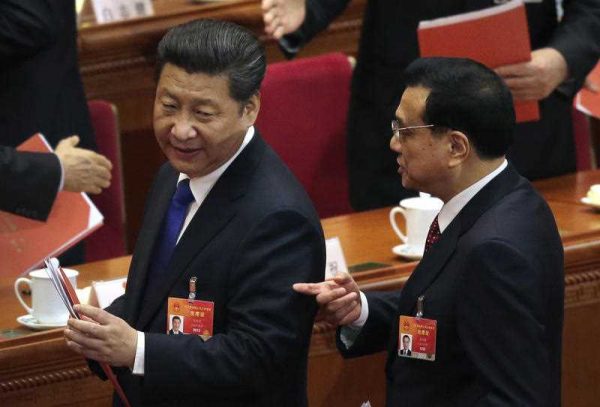Before Xi’s appointment as General Secretary of the CCP, there was political drift that threatened to undermine the state. Xi’s predecessor had lost control of political power long before the 18th Party Congress was held in 2012. That Bo Xilai seemed able to set up his own kingdom in Chongqing was a symptom of a deeper malaise in the polity, increasingly remarked upon and worried about in public by the progressive political elite.
Few would disagree that Xi’s commitment to large scale reform, including giving priority to a new concept of the rule of law, has greatly elevated his own power and swept aside many of the uncertainties that were gnawing at the heart of the one-party state before he came to power. But others are less certain about where his vision for China’s future may be leading.
There are many big structural problems with which Xi and his leadership team were confronted at the beginning of their reign. The monopoly power of crucial state-owned enterprises (SOEs), for instance, had begun to grow rather than weaken in the half-decade or so after the global financial crisis Collusion between government officials and businesses had become endemic, reinforcing special interest groups and exacerbating the problem of corruption. These issues, combined with inflated real-estate prices, had caused a dramatic drop in confidence among Chinese people.
Xi took little time to recapture the central political ground and consolidate his power in all domains. Xi’s new authority strengthened his hand in initiating comprehensive reforms in different sectors and government institutions. The Party’s Central Committee plans to deepen reforms encompassing the ‘modernisation of the state governance system and governance capacity’. The embrace of the rule of law at the Fourth Central Committee Plenum last year and the promulgation of the Four Comprehensives slogan flagged the rule of law as one of the four absolute priorities for the Chinese government. Constitutionalism was also linked to building China under the rule of law. These moves have won widespread support and lifted Xi’s personal standing hugely. More recently the president has published a book of maxims and instructions about ‘the comprehensive advancement of Socialist rule of law’, another strong pointer that the top leadership has committed itself to a process of deepening legal reform.
It appears that the Chinese leadership sees legal reform as an indispensable step forward in improving the institutional structures of the Chinese state. This has clearly provided reassurance to very many Chinese people; it has also encouraged those watching the evolution of the Chinese state from abroad to hope for convergence towards institutional and governance structures more like those with which the citizens of modern states, even democracies, are more familiar.
Rogier Creemers, in our lead essay this week, says that ‘while it is tempting to dismiss (these) moves as mere ideological posturing, China’s intentions for rule of law are genuine’.
But how should we really interpret the potential impact of these reforms that aim at entrenching the rule of law in China? Creemers cautions that one needs to understand what the term fazhi — the Chinese word for ‘rule of law’ — means in party parlance.
In CCP parlance, Creemers argues, the rule of law does not entail the creation of a liberal state. ‘Legal norms do not exist outside of and above the party-state structure. In the 20th century, the CCP produced a number of constitutional documents, which paid lip service to liberal ideals such as free speech, free association and democratic representation. But, in practice, these provisions have remained dead letter. And the application of foreign legal reform models is rejected explicitly’.
The reason for this, Creemers explains, can be found in CCP ideology, which still conceives the party’s core task as leading the rejuvenation of the Chinese nation. Its mandate is to take whatever measures are necessary to transform the economy and society, and to drive progress. Members of senior party circles are the ones who have to assume the central tasks that would be undertaken by parliaments in liberal democracy — ‘deliberating and defining social and economic means and ends…. The party alone has the correct intellectual approach and policymakers take pains to stress that decisions have been taken on a ‘rational’ basis for all important policy documents’.
So, the argument goes, a significant objective of the fazhi agenda is to strengthen control over the party-state apparatus. Creemers notes that the ‘CCP has consistently refused to countenance independent and external oversight, such as free media’. As much as possible and convenient, though perhaps not entirely .
Certainly analysts who base their interpretation of where the leadership’s rule of law campaign is headed on the doctrines and psychology of the party and the Chinese state make a strong and persuasive case. Yet there are others, including philosophers within the CCP itself, who are acutely aware of the contradictions in this course.
Whatever the ambitions to control and command, the prominent emphasis in China now on the rule of law is an important shift from the old reference points of clan and emperor — and relying on virtuous leadership to deliver fairness and justice for the people — to the idea of embodying the public interest in a constitution and to raising the position of the rule of law.
Caution is surely warranted. It remains difficult to tell where this might all end. Chinese readers at the top are certainly among the most avid readers of the new Western tracts about the pillars (including the rule of law) upon which both the success and frailties of democracy have rested. This includes the idea that a system of rule of law brings attendant rights and duties and civic responsibilities that must impinge upon the behaviour of leaders, however virtuous, as well as upon the behaviour of other and ordinary citizens.
Peter Drysdale is Editor of the East Asia Forum.

